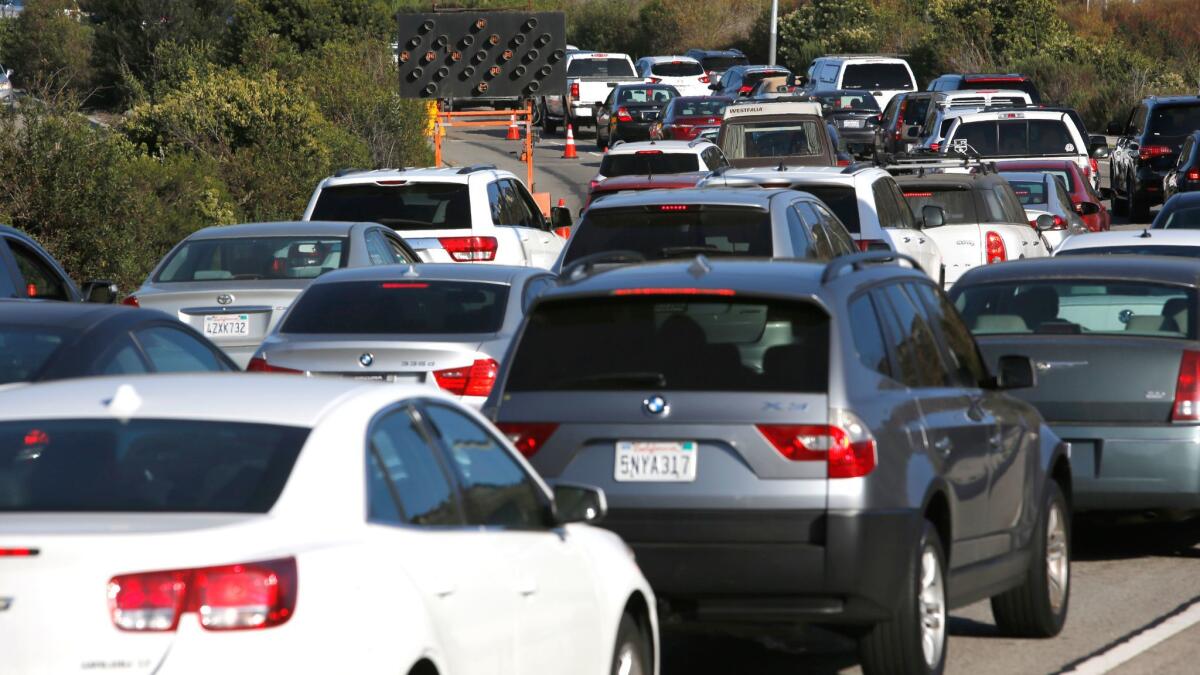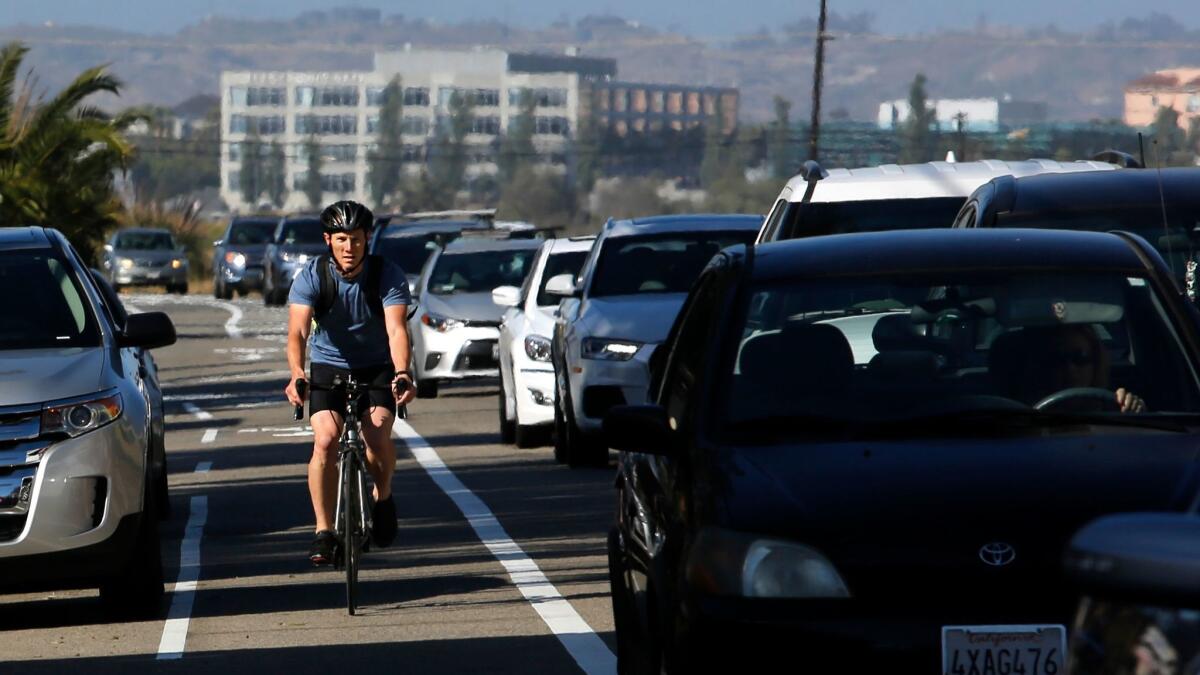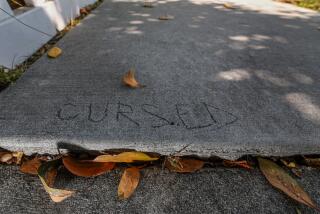Irate commuters threaten a lawsuit over narrowed streets in Playa del Rey

South Bay commuters looking to avoid the 405 Freeway have long taken an alternate route through Playa del Rey, passing the coastline and the Ballona Wetlands to reach Santa Monica.
The route is popular — with more than 24,000 vehicles per day — but some residents complained that harried commuters speeding through the neighborhood put pedestrians and children at risk.
For the record:
10:05 a.m. June 23, 2017A headline on an earlier version of this article referred to narrowed streets in Playa Vista. That neighborhood’s streets did not have lanes of traffic removed.
The friction came to a head this month, when Los Angeles officials eliminated 9.4 miles of traffic lanes and added 4.3 miles of bike lanes in an effort to reduce collisions.
The restriping led to bumper-to-bumper traffic, sending drive times and tempers soaring. Opponents have drafted an online petition calling on City Councilman Mike Bonin to reverse the “one-lane madness,” as well as a fundraising campaign for a formal appeal to the City Council — and a lawsuit to reverse the project, if it comes to that, organizers say.
The fight offers a glimpse of future battles as Los Angeles officials roll out dozens of similar projects over the next decade. Two sweeping initiatives — Vision Zero and Mobility Plan 2035 — call for reducing traffic deaths and improving transit and bike infrastructure across the city, changes that will frequently come at the expense of travel lanes on major thoroughfares.
“Change is hard, and people’s first reaction to change is the most negative,” said Seleta Reynolds, the Transportation Department’s general manager. It helps, she says, if the public is involved in the process.
That was not the case for Vista del Mar, one of the few major streets that bypasses Los Angeles International Airport and connects the South Bay and the Westside. Last month, with little warning, the city narrowed the beachfront street to one lane in each direction in an effort to reduce liability for fatal traffic collisions.
The other lane reductions — on Pershing Drive and Culver, Jefferson and Venice boulevards — were advertised for months through meetings, social media and Bonin’s newsletters to constituents, officials say.
The traffic should calm down in a few weeks, city officials say. The narrower streets are expected to spare about 16 people each year from severe injuries in car crashes.
Change is hard, and people’s first reaction to change is the most negative.
— Transportation Department general manager Seleta Reynolds
More than 5,800 people from Los Angeles and several South Bay cities have signed the petition, and the fundraising campaign, “Fight L.A. Gridlock,” has generated nearly $16,000.
“We support street safety,” said John Russo, a 43-year-old Playa del Rey resident who started the fundraiser. “We just want to be brought to the table. And we want to try to find a solution that doesn’t punish people in cars who want to go home and have dinner with their families.”
Frustrated commuters have vented about delays on social media. Others have flooded Bonin’s phone lines and Facebook page with complaints, insults and threats to recall him from office.
The changes, Bonin said, have sparked “some very ugly reactions.”
We want to try to find a solution that doesn’t punish people in cars who want to go home and have dinner with their families.
— John Russo, Playa del Rey resident
The Vista del Mar redesign followed the Los Angeles City Council’s decision in April to pay $9.5 million to settle a lawsuit filed by the parents of a 16-year-old girl who was struck and killed by a taxi driver as she crossed the street.
At the advice of City Atty. Mike Feuer, transportation employees rushed to redesign the street before summer crowds began descending on Dockweiler Beach, Reynolds said. (A Feuer spokesman said he could not comment on “confidential advice that may or may not have been given to our client.”)
To speed up the project, the city truncated the public outreach process. That was a mistake, Reynolds said, because “people were caught by surprise.”
Vista del Mar was “by far the largest restriping project that the department has ever done,” she said. The city shifted all parking to the west side of the street, to discourage people from darting across traffic, and narrowed the route to one lane in each direction.
Removing parking entirely, as some commuters have suggested, would have put the city at odds with the California Coastal Commission, which has traditionally held that removing parking in the coastal zone is a form of denying access to public beaches, Reynolds said.

The changes to Culver, Pershing and Jefferson began with a group of Playa del Rey residents who approached Bonin’s office with concerns about safety more than two years ago.
One was Ryan Wewers, a 35-year-old drone pilot, who said he stopped crossing the street as he walked his dog because commuters drove recklessly.
“One of the first things I noticed here was not feeling safe walking around,” said Wewers, who moved to California from Kansas. “Everybody wants to be able to walk their dogs and give their kids a safe place to play in the yard without traffic flying through.”
Still, he said, he would be open to modifying the projects, provided the changes can keep drivers, pedestrians and cyclists safe.
“Everybody in Southern California wants to go as quickly as possible from Point A to Point B,” Bonin said. “But by the same token, nobody wants people speeding through their neighborhood. Playa del Rey is also somebody’s neighborhood.”
Nobody wants people speeding through their neighborhood. Playa del Rey is also somebody’s neighborhood.
— Westside Councilman Mike Bonin
Advocates have filed an administrative appeal against the Vista del Mar project with the City Council. If that fails, a lawsuit will likely follow, alleging that the city violated the California Environmental Quality Act while implementing the project, said Ed McPherson of Manhattan Beach, another member of the fundraising group.
“We’re ultimately going to try to reverse this horrible situation,” McPherson said.
The changes to Vista del Mar have sparked outrage among some movers and shakers in L.A.’s tech community, which has a growing presence in Playa Vista.
“There are thousands of people who drive that way every day, but we’re not their constituents, and we’re not their voters,” said Peter Pham, the co-founder of a venture capital firm and business incubator, who lives in Manhattan Beach. “We don’t understand how this decision can be made without thinking of the impact that it will have on the region.”
Bonin pushed back against that idea, saying other cities, including Santa Monica and Manhattan Beach, have narrowed their roads without consulting Los Angeles.
“More regional is better, but let’s not make the argument that Playa del Rey is the only community that has the burden of working with others,” Bonin said.
The narrowed streets are mostly lines of paint and changes to signals, and can still be modified, Reynolds said. But removing the projects entirely “would be problematic and unusual.”
For more transportation news, follow @laura_nelson on Twitter.
ALSO
Lakers take ex-UCLA point guard Lonzo Ball with No. 2 pick in draft
LAPD Chief Beck personally arrests officer on suspicion of having sex with a 15-year-old
More to Read
Sign up for Essential California
The most important California stories and recommendations in your inbox every morning.
You may occasionally receive promotional content from the Los Angeles Times.











